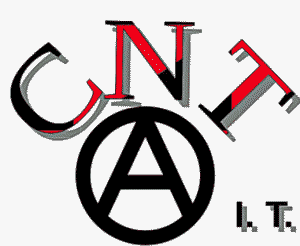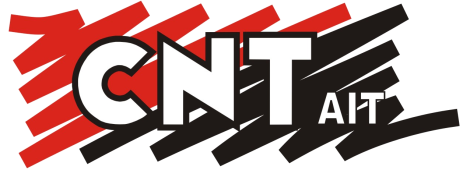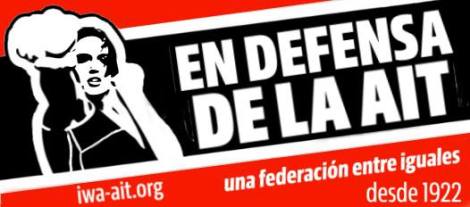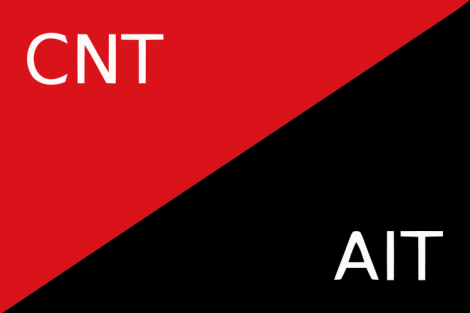
Over the past several months I have been posting material on a split developing in the International Workers’ Association, with the Spanish CNT calling for a “refounding” of the IWA-AIT at a special congress being organized outside of the auspices of the existing IWA-AIT. Here I present an analysis by Laure Akai, the Secretary of the IWA-AIT, regarding the split. Akai refers to the Spanish CNT and the other groups that want to “refound” the IWA-AIT as the “renovados,” for want of a better term. However, this does create some confusion, as the CNT itself split in the late 1970s/early 1980s between the more traditional anarcho-syndicalists, who kept the CNT name, and the Spanish “renovados,” who created a separate organization, the Spanish CGT (not to be confused with the French CGT, which ceased to be a revolutionary syndicalist organization by the First World War, and has been effectively controlled by the French Communists (Marxists) since the early 1920s). Akai is concerned about what is, in effect, the creation of a third international for syndicalist-styled unions, because the Spanish CGT is already loosely allied with other “modern syndicalist” unions that participate in State controlled union elections and sometimes receive funding through the state in accordance with their individual states’ labour representation schemes (such as “works councils,” not to be confused with “workers’ councils,” which are not state-controlled but worker controlled organs of revolutionary self-management). Akai refers to this group as the “Red and Black Coordination.”

What has confused many people, myself included, is why the CNT doesn’t simply reunite with the CGT, as their policy differences seem to be disappearing, with the only real sticking point being the receipt of state funding. Akai’s piece raises these and many other important issues, including the possibility of a return to the pluralist form of organization of the original International Workingmen’s Association of the 1860s and 70s, where workers opposed to state or class collaboration worked together with other groups that favoured participation in existing political systems and lobbied for state law reform, until Marx engineered the expulsion of the anarchists at the 1872 Hague Congress (all of which is covered in much greater detail in my book, “We Do Not Fear Anarchy – We Invoke It”: The First International and the Origins of the Anarchist Movement).

Laure Akai: Why do we need a third International?
Over the last dozen or so years, at least in Europe, two internationals have existed – the IWA and the Red and Black Coordination. The latter has never been a formalized federation, but more of a network whereas the former has always had a more strict federative form. Nevertheless, we can still use the word “International” to refer to the RBC as indeed it had membership on an international level.
With the existence of the two internationals, organizations could have a choice. If an organization tended towards a certain tactical unity in relation to the state, class collaborationist institutions and horizontal internal structure, it usually (but not always) tended towards the IWA. On the other hand, if an organization tended towards tactical flexibility and if this included the use of certain institutions, or if it tended to favor more integration of various syndical tendencies, it tended to join the RBC.
Despite recent attempts at revisionist history, the IWA was born out of anarchist ideas, that a federation of revolutionary unions could exist whose goals were the creation of a stateless society. In this sense, it was the continuation of an earlier tradition, when libertarian socialists and anarchists broke with the Marxist/statist tradition of the First International. Further factors contributed to its evolution, such as a critique of the mistakes made in Spain or a rejection of the social democratic and class collaborationist schemes which spread after the Second World War. In the 50s, as the federation revived itself, it opted for tactical unity and henceforth tended to promote a set of ideas of what anarchosyndicalist unions could look like.
The RBC however grew out of tendencies that either had left the IWA or had split from its sections, typically due to questions such as state-supported schemes or forms of representative unionism in which they participated. New adherents may have had different motivations for joining RBC, not IWA; among the reasons I am aware of include a preference for working closely with some particular RBC unions, not thinking the issues which the IWA found important were important or having a vision that a syndical organization should be more of a neutral one in respect of the question of the state…
There was a choice of internationals with different tactics. A few organizations felt no need to join either or felt that the differences were insignificant and did not feel inclined to make any choices.
The situation has changed on the landscape since a few unions have decided to attempt to take over the IWA project, excluding the majority of its member Sections and inviting others to join it. Of course it is very unlikely that the real IWA will dissolve itself. We don’t know about the RBC. Will the RBC see this new project as a competitive one or will it try to merge with the “renovados”?
This is where we see who has really been paying attention. The CNT sent out an invitation letter to a conference on the “refounding of the IWA”, which was later published on the internet with a different title, as a conference of anarchosyndicalists and revolutionary syndicalist organizations. (http://www.cnt.es/en/news/open-invitation-letter-bilbao-international-co…) The purpose of the conference though is the creation of this new international. As we read in the invitation, the new international would include organizations which, among other things, do not receive “economic funding from the state due to being a union or carrying out union activity”.
What this actually means is that the new initiative does not envision the inclusion of the [Spanish] CGT, which receives money from the state.
Additionally, members of IWA unions can refer to the report sent from the delegate to the USI Congress last year where both USI and CNT representatives told the FAU delegate that FAU would not be supported in the IWA if it were to cooperate with the CGT or USI Roma. (Delegate’s Report to IWA, May 11, 2015, p.4)
For those not aware of the history, USI suffered a split in the 90s and only one USI faction was recognized as the Section of the IWA. Since that time, relations between the unions in that country remain very sour and the IWA was asked many times by USI to defend it from the actions of USI-Roma (which was how the other faction was called by us).
The ideas for requirements to join this new international may also exclude USI-Roma, if USI’s traditional claims about its activity are still current or true. (This relates to support of political parties. I do not pretend to know the answer to that.)
According to the criteria sent out in invitations, we can proceed with the assumption that the CGT is not really welcome in this new initiative. So how then will those who are comrades of the CGT, some supported for years financially, react to this new initiative and the attempts to invite them to it?
We cannot say for sure and various scenarios are possible. In the past years, individual supporters of some of the RBC organizations within the IWA have tried to suggest that a “reestablished” IWA might be attractive to them or that they would prefer to work with the CNTE [the Spanish CNT] than the CGT. (IWA members can see for example the report of the CNTE delegate to the FAU Congress, sent to Sections in June 2016.) These can only be treated as personal opinions of individuals or as attempts to float the ideas of a new international past others. Nonetheless, there may be some unions that could have reasons to change in orientation. One can name the CNTF [the French CNT], where a split occurred and those in favour of more professionalized unionism formed a new organization. This does not assume that any changes will in fact take place, especially as years of ties have already been established in the other network.
No doubt the organizations will have to discuss what this means. Ultimately, this discussion will also have to treat the fact that now not 2 but 3 internationals will be there and that not everybody from the RBC may be welcomed in the renovado international…
However, in some of the RBC organizations, a real discussion may not be necessary since the decision to attend the conference or not will be taken by executive organs.
Additionally, we understand that other entities which are either not unions or formal entities may participate in this conference.
All of this might leave readers in even more confusion than before. Some, it seems, were hoping for a reunification of those who parted ways decades ago… Those that never understood the reason for tactical splits and separate internationals in the first place are no doubt scratching their heads and just repeating the idea to themselves that we need to be “all together” to be stronger. Such commentators may be truly baffled then when they see that instead of more “unity”, the creation of a third international actually threatens to create another division. In addition, attempts to legalize the IWA by the split-off faction would threaten a rather long-term conflict, the mediation of which might fall on the state.
Attempts to know what the Troika envision for the new international and why they have decided to adopt guidelines that exclude the CGT are complicated by the fact that, although such an invitation was published, no real decision has been made amongst the membership, at least in the CNT. Members of the IWA may refer to the CNT Congress decisions (sent to all the Sections on April 4, 2016) or to the actual proposals of the CNT Congress (sent by the pro-AIT [IWA] faction on various dates in 2015). Details about potential affiliates such as not being funded by the state do not appear anywhere in the Congress agreements. Nor do the details about who to invite or even the decision not to attend the real IWA Congress, but instead hold a refounding Congress outside of the federation.
What this means is that this “requirement” was added later. Those who care about matters of process (which unfortunately may not be many) may then ask about the circumstances of making such decisions. It seems that, although this may have been discussed somewhere, these details were agreed “behind closed doors”. The reason I say this is because maybe one of the three organizations discussed these minimal requirements somewhere, but it is not a decision of the CNT Congress. Such a proposal was not put before the CNT membership before the last “refoundation” meeting in June and the “results” of this meeting not reported until 3 months later. These requirements were not consulted beforehand, nor reported to the membership in this report. And since that time, no CNT Plenary was held. (The Plenary will only take place today.) How is it then that the additional requirements got added without any binding decision on the part of the CNT membership?
This fact can only be understood with a deeper understanding of what is currently going on in Spain. Besides a certain verticalization of the decision-making process, where delegated people feel free to take bolder and bolder steps, there is also a problem of diverse ideas and expectations in that organization. Currently, there is a part of people who want to remain in the real IWA, a slightly larger part who don’t and a small part who apparently wanted some changes but did not understand that, in fact, the CNT was choosing to form a parallel federation. Within the part that wanted to leave (or perhaps, more accurately, wanted to take over the organization and inorganically expel most of its Sections), there is also no consensus as to what they should do next. Among them are those who have commented that they don’t even know why they split with the CGT, and those who know why and still believe that the CNT is very different, at least in terms of its relation to the state.
In the current situation, where a few dozen unions have been already purged or left the Confederation [CNT] and are forming their own, and where a number of large unions still support the IWA, the pro-integration faction actually cannot afford to propose any formal federation with the CGT. The real support that they have for the new project is delicate, perhaps tentative. At this point, it seems that they have become concerned that internal opposition will grow.
Another theory would be that, in fact, the competition with the CGT is going strong and that the CNT hopes to grow by gaining more members and more comrades from the CGT’s traditional sphere of influence. In recent years, proponents of such strategies have often boasted that some people, after trying the CGT, decided that they preferred the CNT. Perhaps they are hoping that by adopting a somewhat different approach, more people will join them and that they would gain in influence. Perhaps some are convinced that their tactics are substantially better.
One cannot help but notice now that that the catalogue of differences between the CGT and the CNT has narrowed. The CGT is excluded from the new plans because it receives state subsidies. However, the radical part of the CNT still publish articles telling about the differences between the organizations that provide a much longer list. One is the use of work councils, an issue which caused some tactical divisions in the IWA over the years.
The requirements for the new international do not really refer to such issues. The reason for that is that two of the founders of this initiative have, to some extent, involvement and some of the organizations that they are inviting participate in class collaborationist schemes. The renovado international would exclude any union that takes a state subsidy, but not a union with people who were freed from work activities on the cost of the enterprise. Receiving financial support from the state is out – but no word about receiving financial support from a business. Nor is there any word about secondary state-funding. Certain organizations which actively support various initiatives around the world are themselves funded directly by the state and connected to the activity of political parties. Usually these organizations act as NGOs but in fact, have close ties to the government or to factions within it.
This means that the perceived differences between the renovados and some unions which have fallen outside the IWA have unfortunately narrowed. However, despite this, both the CNT and USI have pushed to limit integration with the organizations that split off from them.
Leaving this topic, as it cannot be properly developed without conjecture, another “requirement” is worth pointing out: that the new organizations should not be “vertical organizations”. However, it seems to me that my definition of this differs dramatically from theirs. I don’t consider any organization where decisions are routinely made from above or behind closed doors to be very horizontal. Conveniently, there is no definition for this offered. For sure, organizations which are not very horizontal were invited.
The last theory which was raised by some in the IWA was that a need for control was one of the motivations for CNTE to want a split. This theory was supported by the fact that their proposals in the IWA seemed to focus on getting more votes and defederating member Sections, rather than on building unionism in the federation. Some of those who see this as an underlying factor have also at some point commented that the CNT should go with their proportional voting to the CGT and ask for a federation. The implication being that they would have absolutely no interest in applying such criteria if they were federated with larger organizations. So one could wonder whether the issue of state funding is still so essential to the CNT that they won’t federate with CGT, or whether the real issue is that they want to be the big kid on the block and would not like, by the logic of their own ideas, to be dominated by that organization.
With the situation still in a dynamic phase, one cannot predict what will happen in the next months. During this time, the RBC will meet, the new Confederation in Spain (which wants to “refound the CNT-AIT”) will have a Congress and the conference about the parallel project of the renovados will be held. All of this before the Congress of the IWA.
Whatever the outcome, I personally don’t think that the creation of a third international will do anybody much good. When I say this, it is not because I think we all have to be in one federation or that the fewer organizations the better. Actually, I strongly believe in free association and that if you want to explore another way, that you should do it without pressure to remain together. The reasons for such an assessment are complex and again, perhaps need to be developed separately. The attitudes displayed towards the rest of the IWA have been consistently awful and have been usually aimed at disenfranchising organizations and undermining morale, instead of concentrating on solidarity and union activity. On the other hand, although I am not a supporter of the RBC, I also see that the new international project seeks to form itself partly on some of their member organizations, which in turn also threatens to undermine this project. If it wasn’t this way, they should have just joined [the RBC] or try to integrate their projects.
Not that I am arguing for organizational integration. Some RBC unions actively pushed for and financially supported the development of a more hierarchical unionism, politically diverse and dependent on mainstream practices and, at times, collaborationist schemes. Although I have plenty of acquaintances and even a few friends on that side, and although I have supported a few of the concrete struggles developed by their unions, it’s not the kind of unionism I’d like to see develop. My opinion is that if we want to develop a more horizontal and radical unionism, it is best done with other like-minded people, in an atmosphere which is supportive of these ideas, not always trying to talk them down. However, at this point, what the renovados are up to hardly looks better to me than the RBC unions. Some people in the renovado unions been expressing their support of some of the more mainstream practices of the RBC unions and would have even the [RBC unions] that are quite hierarchical in their project. This means, in essence, they accept the practices of most (but not all) of the unions and this means that the reason for having something separate seems not too clear to some people who have asked me about this.
Because of the nature of invitations sent and not sent, and because of the criteria set, the reason for having a 3rd international instead can be seen as primarily the CGT. It is now in a position where the renovados will try to effectively isolate them from federation with other unions who see themselves in a similar tradition. The IWA is also in this position as the renovados try increasingly to discredit it and cause commotion, so as to discourage people from being in it. The renovados essentially are trying to gather people around a vision which they haven’t even really worked out themselves. And which is far from universal acceptance, at least inside the CNT.
At this point, I will repeat here what I have said to people who have asked me privately about these matters: what is most important to me is what the IWA will do in light of these developments. Will some members be discouraged by everything to the point that they are paralyzed, or will Sections use this as a wake up call? A wake up call because for years there hasn’t been good discussion and because we don’t always coordinate as well as we could. A wake up call because none of us can afford to be slack about organizing ever again. Or that tendencies in syndicalism are moving back 150 years to a time when anarchists did not strive to make their own organizations and that, in light of this, we cannot afford to be irrelevant?
I can only hope that what does not kill us will (eventually) make us stronger.
Laure Akai
(http://cia.media.pl/why_do_we_need_a_third_international)






















